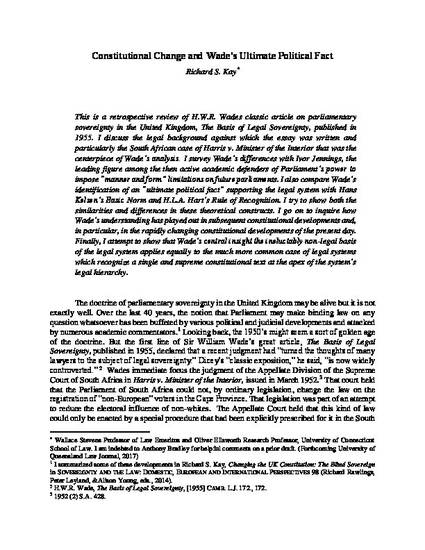
Article
Constitutional Change and Wade's Ultimate Political Fact
University of Queensland Law Journal
(2016)
Abstract
This is a retrospective review of H.W.R. Wades classic article on parliamentary sovereignty in the United Kingdom, The Basis of Legal Sovereignty, published in 1955. I discuss the legal background against which the essay was written and particularly the South African case of Harris v. Minister of the Interior that was the centerpiece of Wade’s analysis. I survey Wade’s differences with Ivor Jennings, the leading figure among the then active academic defenders of Parliament’s power to impose “manner and form” limitations on future parliaments. I also compare Wade’s identification of an “ultimate political fact” supporting the legal system with Hans Kelsen’s Basic Norm and H.L.A. Hart’s Rule of Recognition. I try to show both the similarities and differences in these theoretical constructs. I go on to inquire how Wade’s understanding has played out in subsequent constitutional developments and, in particular, in the rapidly changing constitutional developments of the present day. Finally, I attempt to show that Wade’s central insight the ineluctably non-legal basis of the legal system applies equally to the much more common case of legal systems which recognize a single and supreme constitutional text at the apex of the system’s legal hierarchy
Keywords
- Legal Theory,
- Comparative Law,
- Parliamentary Sovereignty,
- HWR Wade,
- Constitutional Law
Disciplines
Publication Date
2016
Citation Information
Richard Kay. "Constitutional Change and Wade's Ultimate Political Fact" University of Queensland Law Journal Vol. 35 (2016) p. 31 - 46 Available at: http://works.bepress.com/richard_kay/15/
